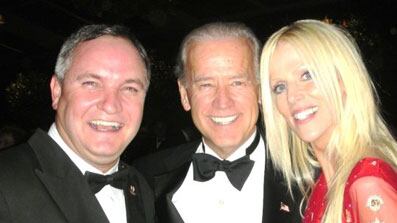A woman named Michaele Salahi and her husband, Tareq, gatecrashed the State Banquet at the White House on Tuesday, and then promptly posted their photographs from the event on Facebook. The photos—so eye-catching, so immodest—tell a story that goes well beyond that of an impudent night out in which a woman and her husband talked their way through security at America's most impenetrable address. What follows, however, are not my thoughts on that breach of security—there will be thorough investigations into that, I'm sure, and some uncomfortable answers. Instead, I offer a sort of theater review, and attempt to address the question of why some Americans (the parents of Balloon Boy, the Salahis, and the others who will surely come in train) put themselves on display in the way they do.
Click Image Below to View Our Gallery of the White House Crashers in Action

What is so striking about the behavior of the Salahis is not the vulgarity of it all, it is the tenacity of that vulgarity. This determination, this drive, is evident in the photographs: Plain to see on Michaele's face, and Tareq's, is a sense of acme, of achievement. They have scaled a pinnacle in public—and have the pictures to prove it. Witness Michaele's picture with Joe Biden, vice president of the United States of America. Her left hand rests on his swelling chest; his left arm is snaked around her cheerleader's waist; her blond head leans into his gray temple. Yet in all this proximity, this physical melding of vice president and gatecrasher, their smiles stand apart: his is a red-blooded, "isn't-life-good-to-me" smile; hers, by contrast, appears calculating, algebraic. This picture isn't just going up on Facebook; it's going straight on to her C.V.
• The Daily Beast interviews the gatecrashers’ mom The crashers' photos go on, with Michaele—a lean-limbed female Zelig—parked right next to Indra Nooyi, Ed Royce, Katie Couric, Rahm Emanuel, Adrian Fenty, and A.R. Rahman. Her husband—a ruddy, hearty chap who wouldn't attract a second glance in a D.C. full of men who answer to that description—is in some of the photos. But the occasion is clearly Michaele's to exploit; he is her prop.
Shortly after the story of the Salahis' presence at the banquet broke, it emerged that Michaele has been pushing hard for a place on a reality-television show, The Real Housewives of D.C. It has since been reported, also, that there was a camera crew from Bravo filming the Salahis as they arrived at the White House. So the charge of exhibitionism against them isn't merely plausible, it's irrefutable. And yet, their audacity apart, one is left with the disquieting sense that the Salahis aren't necessarily bizarre outliers—and that they embody a potent American strain of self-promotion, one that has been spawned by the limitless opportunities for self-display on television and social media.
Americans are exhibitionists by nature, and have been so for generations, perhaps as an ongoing, unresolved reaction against the country's original Puritanism, which censured blusterers and showoffs. This is a large and competitive country, in which the most reliable way to catch the eye, or to rise above the throng is… to catch the eye and rise above the throng. Of course, when an entire throng is trying to rise above itself, an epidemic of free-form vulgarity and solipsism ensues. It doesn't help that our schools regard inhibition in children as a sin far worse than an inability to read and write, and that these same children are immersed at the earliest possible age in a culture of showbiz and television. (I find it less disturbing that some American children start to wear makeup at 10 or 11 than that they start to roll their eyes dismissively at 3 or 4.)
Witness Michaele's picture with Joe Biden, vice president of the United States of America. Her left hand rests on his swelling chest; his left arm is snaked around her cheerleader's waist; her blond head leans into his gray temple.
John Hancock, et al., set great store by "the pursuit of happiness," by which they meant the pursuit of a decent, fulfilling life (not that far removed from Aristotle's concept of "eudaimonia," but with a less obsessive focus on "virtue" than the old Greek had). That idea—which was always likely to come to grief in a modern, materialistic society in which religion recedes into the background—has morphed, for many Americans, into the vigorous pursuit of kicks and highs, quick hits and rapid pleasure.
Michaele Salahi pursues happiness by snuggling up to a vice president who hasn't a clue who she is, and derives her amour-propre from a place on The Real Housewives of D.C. For those of us to whom her life's program is outlandish, Michaele is a species of unicorn to be gawked at briefly, in puzzlement. The alarming thought in all this, of course, is that there are millions of Americans now rooting for her to fulfill her dream. In the end, crashing that state banquet may have been a stroke of tawdry genius.
Tunku Varadarajan is a national affairs correspondent and writer at large for The Daily Beast. He is also a research fellow at Stanford’s Hoover Institution and a professor at NYU’s Stern Business School. (Follow him on Twitter here.)






